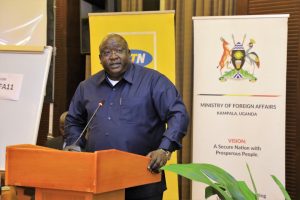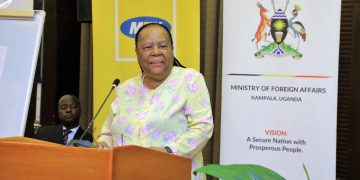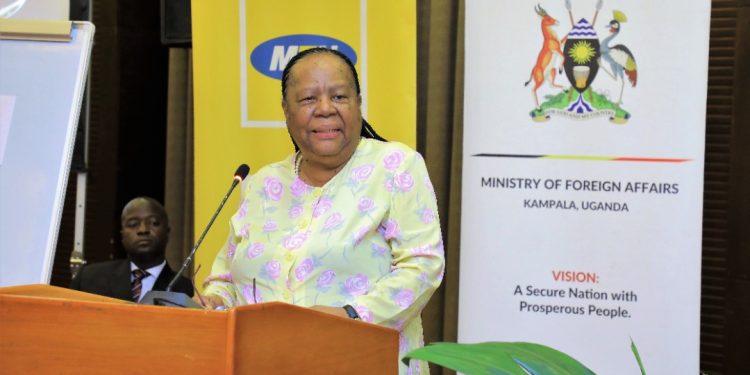Hon. Grace Naled Mandisa Pandor, Minister of International Relations and Cooperation of the Republic of South Africa, has lauded Uganda’s active engagements to strengthen cooperation and bilateral relations with other countries in the region and the African continent.
She was speaking during the Second Session of the South Africa – Uganda Joint Commission for Cooperation held at Serena hotel in Kampala on July 11, 2022.
Pandor who was co-chaired the session with Hon Henry Okello Oryem, Minister of State for Foreign Affairs, said strong bilateral cooperation between African countries and regional economic communities, is a sin qua non to the realisation of the ideals of Agenda 2063, the Africa We Want, which is characterised by sustainable economic prosperity, united, interconnected, and interdependent.
According to him, Uganda, like South Africa and many other African nations, is endowed with immense natural resources, human resources, and sources of capital, which can help the African people deal with the persistent problems related to poverty, diseases, unemployment, inequality and underdevelopment.
“A better life for all can be realised in our lifetime, but we need to work together to address these common developmental challenges that cut across national frontiers.”
He said as the African Union turns twenty this year, there is need to reassert and protect the philosophy of the AU, which is anchored on the principles of Pan-Africanism and be vigilant against attempts to influence the organisation by outside or foreign influence and interests.
“We should not allow ourselves to lose focus of the aspirations of our people as pronounced in the ‘Agenda 2063, The Africa We Want.’ It is incumbent upon like-minded countries like South Africa and Uganda to defend the core values and interests of the AU and to ensure its strategic focus is directed at the socio-economic development of the Continent.”
“We still need to see meaningful improvements in the promotion and protection of human rights, consolidation of the African position on climate change, silencing of the guns, increase in intra-Africa trade and industrialisation, self-financing of continental and regional integration projects, etc.”
He said the implementation of the African Continental Free Trade Agreement (AfCFTA) is critical to bolstering economic recovery efforts on the continent post-Covid-19 pandemic.
According to him, inter and intra-state conflicts continue to threaten the successful implementation of the continental development agenda.
South Africa has been observing with keen interest, Uganda’s efforts to mend relations in the East Africa region.
“Honourable Minister of State, your country, is known for her unwavering commitment to the realisation of the ideals of Pan-Africanism, promotion of sovereignty and independence of African countries, as well as championing regional integration. It is against this background, that we acknowledge Uganda’s efforts to rekindle bilateral relations with countries in the region and throughout the African continent.”

He said issues related to trade and investment are critical hence the need to address all the challenges that threaten and derail the deepening and expansion of bilateral cooperation.
He said this was geared towards the reduction of the cost of doing business between the two countries, removal of barriers to market access for products originating from our two countries, exploration of ways to promote protection of investments, especially in view of the fact that the AfCFTA has been ratified by the two governments.
“The quest for solutions to the eradication of poverty, job creation and reduction of inequality should influence the content, scope and direction of our engagements, as these are shared challenges of our people in both countries.”
In his turn, minister Oryem said Uganda and South Africa enjoy excellent bilateral relations and historical ties forged over several decades of struggle and solidarity.
He thanked the delegation for taking time off its busy schedule to visit the Oliver Tambo Leadership Academy in Kaweweta.
He said South Africa is one of the leading trading partners of Uganda.
In the year ending 2021, the volume of trade between Uganda and South Africa was estimated to be approximately US$ 194 million.
“We believe that there is a lot more we can do together to diversify the range of export products and addressing all non-trade facilitating measures including joint cooperation on issues of standards, and easing the visa requirements for our private sector.”
According to Oryem, the private sector is key to economic growth and South Africa is also one of the biggest sources of Foreign Direct Investment to Uganda.
“MTN that is here with us today is testimony to presence of South African businesses in Uganda.
MTN like many others is contributing to the socio-economic transformation of Uganda and we welcome this and appreciate it.
He proposed that at the next session, they convene a Joint Business Forum on the sidelines of the Joint Commission of Cooperation.
“We welcome more companies to explore investment opportunities in Uganda. Our National Development Plan III has identified priority sectors including Agro-Industralisation, Petroleum development, Tourism development and Mineral development.”











